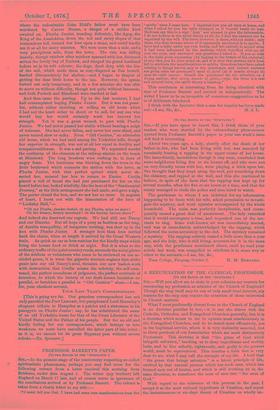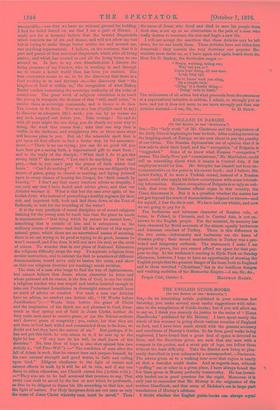A RENUNCIATION OF THE CLERICAL PROFESSION. [TO THE EDITOR OF
THE SPECTATOR:1
SIH,—Will you allow me to state in your columns my reasons for renouncing my profession as minister of the Church of England? Though the step itself may be one of only small local interest, my reasons for the step may require the attention of those interested in Church matters.
What I most profoundly dissent from in the Church of England - is no doctrine peculiar to her,—it is one she shares with the Catholic, Orthodox, and Evangelical Churches generally, but it is a doctrine which seems to me to operate most mischievously in the Evangelical Churches, and to be stated most offensively, not in the baptismal service, where it is very distinctly asserted, but in those portions of our formularies which are most distinctively Protestant. This doctrine is that "the grace of God which bringeth salvation," teaching LU3 to deny ungodliness and worldly lusts, and to live soberly, righteously, and godly in the present world, must be supernatural. This touches a faith that is very dear to me, what I may call the strength of my life. I hold that "the grace that brings salvation" is a latent principle of life, evolved by that natural process which has made man, which has formed men out of brutes, and which is still working on in the same direction, to transform the sons of men into "the sons of God."
With regard to the existence of this process in the past, I accept it as the most rational hypothesis of Creation, and reject the instantaneous or six-days theory of Creation as wholly un-
warrantable,—one that we have no rational ground for holding. I find the belief forced on me that I am a part of Nature. I could not for a moment believe that the inward disquietude which convicts me of sin and shame, and will not allow me rest but in trying to make things better within me and around me, was anything supernatural. I believe, on the contrary, that it is part and parcel of that universal disquietude which stirs all living matter, and which has created us and all the living forms we see around us. In fact, in my own dissatisfaction I discern the living presence of my Creator, who is working in and through me to create a better world than has been yet realised. The true conversion seems to me to be the discovery that there is a God working in us and through us,—the discovery that "the kingdom of God is within us," the recognition of what Bishop Butler teaches concerning the sovereign authority of the voice of conscience. The great work of religious education is to teach the young to recognise the dictates of that "still, small voice," to receive them as sovereign commands, and to hasten to do them. Yes, hasten to do them. You are at a loss (Carlyle used to say) to discover an adequate life's work ; you can by no means see any such mapped out before you. Take courage ! Go and do with all your might the one thing you do clearly see your way to doing, the work that comes first ; take that one step that is visible in the darkness, and straightway two or three more steps will become plain to you. But oh ! the miserable spell that is put upon all first efforts to find a better way, by the announce- ment,—" There is no use frying; you can do no good till you have first got a saving faith, a supernatural gift to start from ;" and to the reply of the disciple, "What shall I do to get this saving faith ?" the answer, "You can't do anything. You can't pray,—that is, you can't pray the prayer of faith which God hears." "Can I do nothing ?" "Well, you can use diligently the means of grace, going to church or meeting, and laying yourself open to every chance of hearing the Gospel, for 'faith cometh by hearing." I don't say that many teachers advise so stupidly, I can only say that I have heard such advice given, and that our Articles warrant it. What is this but the case over again of the foolish Jews, who instead of prescribing a healthy regimen or their sick and impotent folk, took and laid them down at the Pool of Bethesda, to wait for the troubling of the water?
It is the very paralysis of moral discipline or of sound religious training for the young man to teach him that the grace he needs
is supernatural—" that thing which by nature he cannot have," something that is outside of him and is extraneous to the ordinary course of nature—and that till the advent of this super- natural grace, which there are no ascertained means of securing, there is no use trying to be good or trying to do good, because he won't succeed, and if he does, it will not save his soul, or the souls of others. No wonder that in our plans of National Education the religions difficulty stops the way. To separate religious from secular instruction, and to entrust the first to ministers of different denominations, would serve only to hasten the crisis, and show us that our religious doctrine (or teaching) needs revision.
The state of a man who longs to find the way of righteousness, but cannot believe that Jesus, whose character he loves and whose personal aid he craves, is the Son of God, is one for which a religious teacher who was stupid and leaden-hearted enough to take our Protestant formularies in downright earnest would have no word of advice or comfort. For such a man our Articles have no advice, no comfort (see Article xiii., "Of Works before Justification ") :—" Works done before the grace of Christ and the inspiration of his Spirit are not pleasant to God, foras- much as they spring not of faith in Jesus Christ, neither do they make men meet to receive grace, or (as the School-authors say) deserve grace of congruity ; yea, rather, for that they are not done as God bath willed and commanded them to be done, we doubt not but they have the nature of sin." But perhaps, if he has not got this faith, he may attain to it, if he acts up to the light he has. "If any man do his will, he shall know of the doctrine." No, that door of hope is also shut against him (see Article x., "Of Free-Will") :—" The condition of man after the fall of Adam is such, that he cannot turn and prepare himself, by his own natural strength and good works, to faith and calling upon God." Diligent obedience to the light of nature and earnest efforts to walk by it will be all in vain, and if any one dares to affirm otherwise, our Church curses him (Article xviii.) : —"They also are to be had accursed that presume to say, That every man shall be saved by the law or sect which he professeth, 10 that he be diligent to frame his life according to that law, and the light of nature. For Holy Scripture doth set out unto us only the name of Jesus Christ whereby men must be saved." Thus
the name of Jesus, who lived and died to save his people from their sins, is set up as an obstruction in the path of a man who really desires to renounce his sins and begin a new life.
I will not accept the assertion that these Articles may be left alone, for no one heeds them. These Articles have not fallen into- desuetude ; they contain the very doctrines our popular Re- vivalists most insist on, as I have again and again heard them do. Hear Ira D. Sankey, the Revivalist singer :-
"Weary, working, toiling ono, Why toil you so ?
Cease your doing, all was done Long, long ago.
'Tis to Jesus' work you cling, By a simple faith.
'Doing' is a deadly thing,— 'Doing' ' ends in death."
The uselessness of all action but what proceeds from the assurance of a supernatural initiative is seldom, I admit, so strongly put as here, and yet it does not seem to me more strongly put than our' Articles warrant.—I am, Sir, &c., G. D. &row.



































 Previous page
Previous page